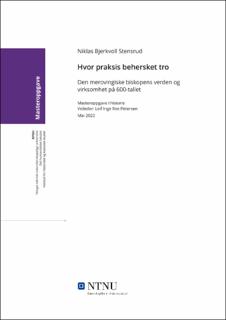| dc.contributor.advisor | Petersen, Leif Inge Ree | |
| dc.contributor.author | Stensrud, Niklas Bjerkvoll | |
| dc.date.accessioned | 2022-07-06T17:22:12Z | |
| dc.date.available | 2022-07-06T17:22:12Z | |
| dc.date.issued | 2022 | |
| dc.identifier | no.ntnu:inspera:111531354:13517013 | |
| dc.identifier.uri | https://hdl.handle.net/11250/3003320 | |
| dc.description.abstract | Sammendrag
I de merovingiske kongedømmene på 600-tallet var biskopene blant deres fremste embetsmenn, med unike utfordringer i deres praksis og ansvar. Utfordringer skapt både av deres egne rolle som prest og opphav i aristokratiet. De påvirket og var påvirket av periodens utviklingsløp som klostergrunnleggelse, voksende magnatmakt og kongelig policy. De var forkynnere, administratorer, men også verdslige herrer av egen dimensjon i en verden mer betinget av kristen tankegang. En verden biskopene, samfunnet og eliteaktørene rundt dem ble bedre til å forsone med selv store brudd på hva en kunne anta om deres ideelle virksomhet. Merovingerbiskopenes sekulære nødvendigheter og aristokratiske interesser formet forholdet til deres menighet, kirkestab, andre embetsmenn, kongemakt og lokal elite. Deres arena var primært byen med dens egne behov og lokale aktører, og fra andre forhold til kongemakt, magnater og klostre ble føringer lagt på utførelsen av deres arbeid som en patron for samfunnets fattige i lov og velferd, men også en aristokrat som selv søkte patronskap blant mektige. Biskopenes tosidige natur, mellom det religiøse og verdslige i deres praksis og utfordringer, ble etterforsket primært mot utviklingene sett rundt Balthilds regentskap. Det blir illustrert i den mulige forskjell i praksis mellom brødrene hun sendte til Lyons og Autun, Genesius og Leudegar. En ble overgitt av sin by til en angrepene hær, den andre seiret mot den samme hæren og kanskje også lyktes i mer av sin praksis som biskop; en aristokrat som balanserte sin interesse som herre og sin plikt som prest. | |
| dc.description.abstract | Abstract
In the Merovingian kingdoms of the 7th century, bishops were among their foremost officials, with unique challenges facing their practice. Challenges created both by their own role as a priest and their origins in the aristocracy. They influenced and were influenced by the changing courses of the period such as monastic founding, growing magnate power and royal policy. They were preachers, administrators, but also worldly lords of their own dimension in a world increasingly affected by Christian thought. A world the bishops, society and the powerful around them became better at reconciling with even major violations of what one might expect from their idealized practice. The secular necessities and aristocratic interests of the Merovingian bishops shaped the relationship with their congregation, church staff, other royal officials, royal power and the local elite. Their arena was primarily the city with its own needs and local actors, and from other relations to monarchy, magnates and monasteries, conditions were placed on the performance of their work as a patron of society's poor in law and welfare, but also as an aristocrat who himself sought patronage among the powerful. The bishops’ dual nature, between the religious and the secular in their practices and challenges, was researched primarily against developments seen around Balthild's regency. It is illustrated in the potentially different practice between the brothers she sent to Lyons and Autun, Genesius and Leudegar. One was surrendered by his city to an attacking army, the other defeated the same force and was celebrated, and perhaps he also succeeded in more of his practice as a bishop; an aristocrat balancing his interests as a lord and his duties as a priest. | |
| dc.language | nob | |
| dc.publisher | NTNU | |
| dc.title | Hvor praksis behersket tro | |
| dc.type | Master thesis | |
